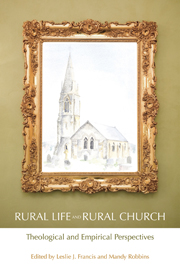Book contents
- Frontmatter
- Contents
- Preface
- Foreword by The Bishop of Shrewsbury, The Rt Revd Mark Rylands
- 1 Introduction: shaping rural theology
- PART 1 PERSPECTIVES FROM THE BIBLE
- PART 2 PERSPECTIVES FROM ORDINARY THEOLOGY
- PART 3 THEOLOGICAL AND SOCIOLOGICAL PERSPECTIVES
- PART 4 HISTORICAL PERSPECTIVES
- PART 5 LISTENING TO VISITORS
- PART 6 LISTENING TO THE COMMUNITY
- 18 Social capital generated by two rural churches: the role of individual believers
- 19 Local festivals in two Pennine vill ages: the reactions of the local Methodist church congregations
- 20 Extended communion: a second best option for rural Anglicanism?
- PART 7 LISTENING TO CHURCHGOERS
- PART 8 LISTENING TO CHURCH LEADERS
- PART 9 SATISFACTION AND STRESS IN MINISTRY
- Contributors
- Sources
- Subject Index
- Name Index
20 - Extended communion: a second best option for rural Anglicanism?
from PART 6 - LISTENING TO THE COMMUNITY
- Frontmatter
- Contents
- Preface
- Foreword by The Bishop of Shrewsbury, The Rt Revd Mark Rylands
- 1 Introduction: shaping rural theology
- PART 1 PERSPECTIVES FROM THE BIBLE
- PART 2 PERSPECTIVES FROM ORDINARY THEOLOGY
- PART 3 THEOLOGICAL AND SOCIOLOGICAL PERSPECTIVES
- PART 4 HISTORICAL PERSPECTIVES
- PART 5 LISTENING TO VISITORS
- PART 6 LISTENING TO THE COMMUNITY
- 18 Social capital generated by two rural churches: the role of individual believers
- 19 Local festivals in two Pennine vill ages: the reactions of the local Methodist church congregations
- 20 Extended communion: a second best option for rural Anglicanism?
- PART 7 LISTENING TO CHURCHGOERS
- PART 8 LISTENING TO CHURCH LEADERS
- PART 9 SATISFACTION AND STRESS IN MINISTRY
- Contributors
- Sources
- Subject Index
- Name Index
Summary
Abstract – Extended communion has been used as a solution for the increasing shortage of ordained ministers; it is not, however, without critics who identify theological problems with its usage. In particular, the three concepts of the Divine Presence, of celebration, and of the communion of the faithful raise questions for congregations utilizing extended communion. Furthermore, the use of lay ministers in the service of extended communion can lead to isolation of the parish priest as well as high-lighting issues about lay presidency. This article discusses these themes in the context of an evaluation of an extended communion scheme in a parish of the Church of England. While there is some evidence for the isolation of the rector, congregational perceptions make no distinction between extended and holy communion services. In the case of home (extended) communions, however, the absence of worship space plays an important part – something about which the literature is silent.
Introduction
With the shortage of clergy in the Church of England, problems have arisen as to how to accommodate the Sunday services of holy communion which require an ordained priest to preside. A number of suggestions have been put forward including non-stipendiary ministers (NSMs) and ordained local ministers (OLM s) as well as local non-stipendiary ministers (LNSMs) (Smethurst, 1986, p. 19). In addition, it is now commonplace for lay people to distribute the blessed elements during a service of holy communion. More radical calls have also been made for lay presidency which can be seen as threatening ordination theology.
- Type
- Chapter
- Information
- Rural Life and Rural ChurchTheological and Empirical Perspectives, pp. 242 - 256Publisher: Acumen PublishingPrint publication year: 2012

